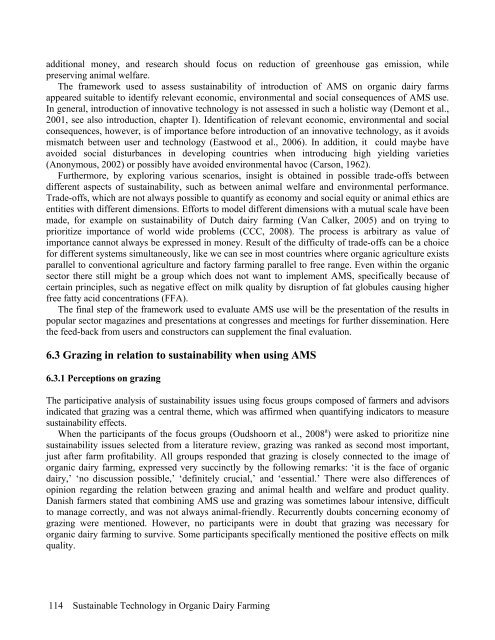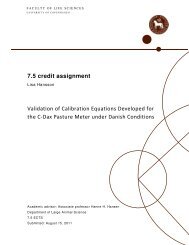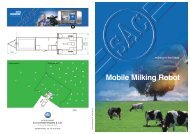Innovative Technology and Sustainable Development of Organic - 1.
Innovative Technology and Sustainable Development of Organic - 1.
Innovative Technology and Sustainable Development of Organic - 1.
Create successful ePaper yourself
Turn your PDF publications into a flip-book with our unique Google optimized e-Paper software.
additional money, <strong>and</strong> research should focus on reduction <strong>of</strong> greenhouse gas emission, while<br />
preserving animal welfare.<br />
The framework used to assess sustainability <strong>of</strong> introduction <strong>of</strong> AMS on organic dairy farms<br />
appeared suitable to identify relevant economic, environmental <strong>and</strong> social consequences <strong>of</strong> AMS use.<br />
In general, introduction <strong>of</strong> innovative technology is not assessed in such a holistic way (Demont et al.,<br />
2001, see also introduction, chapter I). Identification <strong>of</strong> relevant economic, environmental <strong>and</strong> social<br />
consequences, however, is <strong>of</strong> importance before introduction <strong>of</strong> an innovative technology, as it avoids<br />
mismatch between user <strong>and</strong> technology (Eastwood et al., 2006). In addition, it could maybe have<br />
avoided social disturbances in developing countries when introducing high yielding varieties<br />
(Anonymous, 2002) or possibly have avoided environmental havoc (Carson, 1962).<br />
Furthermore, by exploring various scenarios, insight is obtained in possible trade-<strong>of</strong>fs between<br />
different aspects <strong>of</strong> sustainability, such as between animal welfare <strong>and</strong> environmental performance.<br />
Trade-<strong>of</strong>fs, which are not always possible to quantify as economy <strong>and</strong> social equity or animal ethics are<br />
entities with different dimensions. Efforts to model different dimensions with a mutual scale have been<br />
made, for example on sustainability <strong>of</strong> Dutch dairy farming (Van Calker, 2005) <strong>and</strong> on trying to<br />
prioritize importance <strong>of</strong> world wide problems (CCC, 2008). The process is arbitrary as value <strong>of</strong><br />
importance cannot always be expressed in money. Result <strong>of</strong> the difficulty <strong>of</strong> trade-<strong>of</strong>fs can be a choice<br />
for different systems simultaneously, like we can see in most countries where organic agriculture exists<br />
parallel to conventional agriculture <strong>and</strong> factory farming parallel to free range. Even within the organic<br />
sector there still might be a group which does not want to implement AMS, specifically because <strong>of</strong><br />
certain principles, such as negative effect on milk quality by disruption <strong>of</strong> fat globules causing higher<br />
free fatty acid concentrations (FFA).<br />
The final step <strong>of</strong> the framework used to evaluate AMS use will be the presentation <strong>of</strong> the results in<br />
popular sector magazines <strong>and</strong> presentations at congresses <strong>and</strong> meetings for further dissemination. Here<br />
the feed-back from users <strong>and</strong> constructors can supplement the final evaluation.<br />
6.3 Grazing in relation to sustainability when using AMS<br />
6.3.1 Perceptions on grazing<br />
The participative analysis <strong>of</strong> sustainability issues using focus groups composed <strong>of</strong> farmers <strong>and</strong> advisors<br />
indicated that grazing was a central theme, which was affirmed when quantifying indicators to measure<br />
sustainability effects.<br />
When the participants <strong>of</strong> the focus groups (Oudshoorn et al., 2008 a ) were asked to prioritize nine<br />
sustainability issues selected from a literature review, grazing was ranked as second most important,<br />
just after farm pr<strong>of</strong>itability. All groups responded that grazing is closely connected to the image <strong>of</strong><br />
organic dairy farming, expressed very succinctly by the following remarks: ‘it is the face <strong>of</strong> organic<br />
dairy,’ ‘no discussion possible,’ ‘definitely crucial,’ <strong>and</strong> ‘essential.’ There were also differences <strong>of</strong><br />
opinion regarding the relation between grazing <strong>and</strong> animal health <strong>and</strong> welfare <strong>and</strong> product quality.<br />
Danish farmers stated that combining AMS use <strong>and</strong> grazing was sometimes labour intensive, difficult<br />
to manage correctly, <strong>and</strong> was not always animal-friendly. Recurrently doubts concerning economy <strong>of</strong><br />
grazing were mentioned. However, no participants were in doubt that grazing was necessary for<br />
organic dairy farming to survive. Some participants specifically mentioned the positive effects on milk<br />
quality.<br />
114 <strong>Sustainable</strong> <strong>Technology</strong> in <strong>Organic</strong> Dairy Farming




